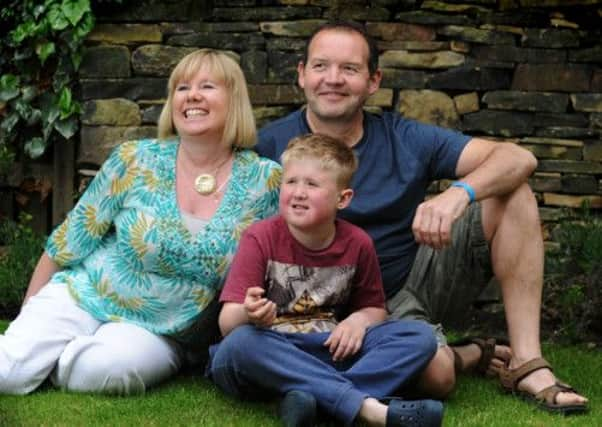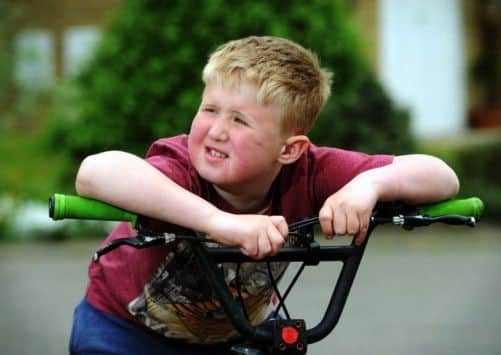How a rare condition led to creation of music event that welcomes everyone


MAX Sutton arrives home from school, his cheeks pink and crumpled from sleep. He’s had a snooze on the 16-mile journey from Boston Spa to Apperley Bridge and is still groggy when he and his pale blonde mop appear.
But after a cuddle from big sister Emily, a glass of milk and a snack, all traces of sleepiness have disappeared and he’s ready to play, badgering his dad Richard to let him go cycling with his friend Alex. That’s not going to happen just now, without an adult available to go along. The boys head outside with a football.
Advertisement
Hide AdAdvertisement
Hide AdMax, who’s nine, travels so far to West Oaks Special School because he was struggling to make progress at the local primary, and his parents researched where he could go that would better cater to his special needs. After a few months’ argument over who would pay for his transport, he is settled and doing well.


“It’s been life-changing,” says Caroline, who’s a part-time health visitor working across a large patch of north-west Leeds. “Before that school was quite a negative experience, even with his own one-to-one member of staff.
“He can be the funniest, sweetest, sunniest boy in the world, but certain things change his mood and behaviour. At school he could go into a tantrum, kicking, biting and shouting.
“At home we have gradually learned strategies to cope with living with Max. For instance, he reacts badly to negative words like ‘no’ or ‘you can’t do that’. We use different words.
Advertisement
Hide AdAdvertisement
Hide Ad“When he was given the ‘yellow card’ by his old school and they said they could no longer meet his needs, we ended up making a change that was good for all of us.”
For anyone who’s ever wondered what daily life is like when you have a learning disabled child, Caroline describes her family’s experience (including the many joyful highs) and their quest for a diagnosis in her occasional blog: www.mumtochromoboy.blogspot.co.uk
Her son has a rare genetic disorder and is, developmentally, around 50 per cent behind other children his age, says Richard, who also trained as a nurse, and until he was made redundant a couple of years ago was a manager in specialist healthcare services.
With their daughter Emily, 20, in her second year of childhood studies at Leeds Met University and also working part-time with autistic children, this is a family with an abundance of caring skills and experience to give to looking after Max.
Advertisement
Hide AdAdvertisement
Hide AdBut even so, life can be difficult and exhausting. And although the couple were health professionals they were just as disorientated as many other parents would be when their beautiful son failed to reach expected milestones in infancy.
“Emily was 10 when we had Max,” says Caroline. “I’d had two miscarriages in between, then he arrived when I was 38 and Richard was 41. I’d had prenatal tests for certain disorders including Down’s Syndrome, and they showed a low risk.
“After he was born he was very sleepy, didn’t open his eyes much or feed well and lost weight. At his six-week check the GP thought there was a problem and referred us to a paediatrician, who said he was fine.”
Looking back, both Richard and Caroline say they felt uneasy and worried, especially when they saw other babies sitting up while Max was floppy and making no attempt to move on.
Advertisement
Hide AdAdvertisement
Hide AdRichard says: “At one year old he failed a hearing test and the health visitor became worried. At 18 months he was diagnosed with global developmental delay in several areas of development, but we were left with loads of questions about what exactly was causing this and whether it could be helped or fixed.”
After years of seeing specialists including geneticists but still without a specific diagnosis, Richard and Caroline found the answer they were looking for – largely through their own research but confirmed by tests – that Max has a very rare genetic disorder which means part of Chromosome 16 is missing.
Modern technology has made such specific diagnosis possible, but the Suttons had already been helped enormously by the rare chromosome disorder charity Unique.
Putting a name to their child’s disorder meant the world to Richard and Caroline.
Advertisement
Hide AdAdvertisement
Hide Ad“Neither Caroline nor I have the same chromosome disorder, so it is just a ‘blip’,” says Richard.
For Caroline, worries that she had done something wrong during pregnancy were erased. “Diagnosis took away the awful guilt.”
“For some parents it doesn’t seem to matter too much if they don’t have a diagnosis for their child. With us it was really important, and in some very practical ways.
“For instance, because Max doesn’t look visibly disabled, when he throws a tantrum in public, people look at him just as a really badly behaved child and blame us. We are now able to say ‘actually he is like this because...’”
Advertisement
Hide AdAdvertisement
Hide AdThey are now able to talk via Unique and other networks with other families whose children have similar disorders.
Thanks to the right schooling he is doing well, and the boy who couldn’t walk when he was three now has outstanding physical skills. He is very determined and has a passion for running, cycling and racket sports, says Richard.
A couple of years ago the family were on holiday in Ibiza and Emily went off with friends to a music festival. Richard, a great live music lover, started pondering how few music and arts events are friendly to the disabled.
He imagined a disabled-friendly festival offering great music and other kinds of performance plus workshops, food, crafts – the elements of any mainstream festival, then put in £10,000 of his own money to realise the dream of Disability Rocks.
Advertisement
Hide AdAdvertisement
Hide AdWith no sponsors or outside funding, the first festival happened on a scorching day last May, when more than 750 people from across the country enjoyed musical acts, comedians and many other art forms at the Nell Bank Centre in Ilkley. The second festival is at the same venue this Saturday.
“We have a rule that around 25 per cent of performers are disabled, and headlining this year is the award-winning comedian Francesca Martinez, who has cerebral palsy. Other acts include Singing Hands, Danny And The Champions Of The World, Bo Weavil, The Loose Salute and The Occasionals.
“I decided to work backwards from the starting point of emphasising the needs of people with a wide range of disabilities, but making everyone who wants to come very welcome,” says Richard.
“It’s just organised in the reverse way to most events, and has special features beyond what other events might offer.
Advertisement
Hide AdAdvertisement
Hide Ad“There is plenty of space, good indoor facilities and wonderful features like a quiet area and a sensory yurt, all surrounded by the most beautiful fields and woodland. I just want it to be regarded, as time goes on, as a really good event that anyone can enjoy.”
Disability Rocks hasn’t attracted sponsors yet, but this year’s event has been given some Arts Council funding.
While music fans make their way to Ilkley for Saturday, and are no doubt hoping for a scorcher rather than a quagmire, Richard Sutton is dreaming again – of taking Disability Rocks events to different parts of the country in future.
The not-for-profit organisation has become almost a full-time job for him now and he’s enjoying himself.
Advertisement
Hide AdAdvertisement
Hide Ad“Yes, I am, because it’s great to have a vision of something that has a positive social impact. It wouldn’t have happened if we hadn’t had Max.
“Organising Disability Rocks has been hard work, but it has been easy to attract great acts – maybe because none of us very far away from disability in our lives.”
The Disability Rocks festival is at Nell Bank, Ilkley on Saturday June 8 from 11am until 7.30pm. Gates open at 10am. For more information and to book tickets go to www.disabilityrocks.org, or you can pay at the gate.
Chromosome disorders
According to Unique, the chromosome disorder database and charity, rare chromosome disorders include extra, missing or re-arranged chromosome material, but not more common conditions such as Down’s Syndrome.
Advertisement
Hide AdAdvertisement
Hide AdIndividually, rare chromosome disorders are just that, but collectively they are common. In fact one in every 200 babies is born with a rare chromosome disorder, one in every 1,000 having symptoms from birth or early childhood and the rest being affected when they grow up and try to have children of their own.
It is usually immediately following diagnosis that affected families have the greatest need for support and, above all, information.
www.rarechromo.org